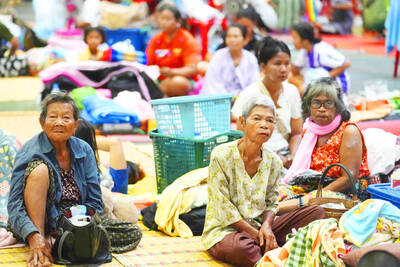Hong Kong yesterday unveiled a proposal that would give schools the option of switching back to teaching in English, 11 years after a “mother-tongue” policy ordered them to teach in Chinese.
The plan, unveiled by Hong Kong Education Secretary Michael Suen (孫明揚) yesterday, is aimed at improving English-language standards that have fallen since Hong Kong ceased to be a British colony in 1997.
If approved, it would give schools the option as of September next year to teach in English in classes where more than 85 percent of pupils rank as high-achievers.
Other secondary schools who do not meet the requirement would have the option of using English for one quarter of lessons.
Suen told lawmakers on an education panel that the move was aimed at improving the English proficiency of students and to overcome the perception among parents that English-medium schools were better than their Chinese-language equivalents.
The move has been welcomed by teaching and schools associations who see it as a way of improving English standards in the city of 7 million.
However, some legislators expressed concern that it would have an adverse effect on the standard of other subjects for students with poor English.
The mother-tongue policy, introduced shortly after the handover when Hong Kong reverted to Chinese rule, has been blamed for falling language standards.
It has resulted in fierce competition for places in the remaining English-medium schools and a sharp rise in the number of local children applying to fee-paying international schools.
Studies have claimed English language standards have fallen and a survey of 2,000 Chinese professionals by the Polytechnic University last November found English was still rated to be the most important business language.

FOREST SITE: A rescue helicopter spotted the burning fuselage of the plane in a forested area, with rescue personnel saying they saw no evidence of survivors A passenger plane carrying nearly 50 people crashed yesterday in a remote spot in Russia’s far eastern region of Amur, with no immediate signs of survivors, authorities said. The aircraft, a twin-propeller Antonov-24 operated by Angara Airlines, was headed to the town of Tynda from the city of Blagoveshchensk when it disappeared from radar at about 1pm. A rescue helicopter later spotted the burning fuselage of the plane on a forested mountain slope about 16km from Tynda. Videos published by Russian investigators showed what appeared to be columns of smoke billowing from the wreckage of the plane in a dense, forested area. Rescuers in

‘ARBITRARY’ CASE: Former DR Congo president Joseph Kabila has maintained his innocence and called the country’s courts an instrument of oppression Former Democratic Republic of the Congo (DR Congo) president Joseph Kabila went on trial in absentia on Friday on charges including treason over alleged support for Rwanda-backed militants, an AFP reporter at the court said. Kabila, who has lived outside the DR Congo for two years, stands accused at a military court of plotting to overthrow the government of Congolese President Felix Tshisekedi — a charge that could yield a death sentence. He also faces charges including homicide, torture and rape linked to the anti-government force M23, the charge sheet said. Other charges include “taking part in an insurrection movement,” “crime against the

POINTING FINGERS: The two countries have accused each other of firing first, with Bangkok accusing Phnom Penh of targeting civilian infrastructure, including a hospital Thai acting Prime Minister Phumtham Wechayachai yesterday warned that cross-border clashes with Cambodia that have uprooted more than 130,000 people “could develop into war,” as the countries traded deadly strikes for a second day. A long-running border dispute erupted into intense fighting with jets, artillery, tanks and ground troops on Thursday, and the UN Security Council was set to hold an emergency meeting on the crisis yesterday. A steady thump of artillery strikes could be heard from the Cambodian side of the border, where the province of Oddar Meanchey reported that one civilian — a 70-year-old man — had been killed and

POLITICAL PATRIARCHS: Recent clashes between Thailand and Cambodia are driven by an escalating feud between rival political families, analysts say The dispute over Thailand and Cambodia’s contested border, which dates back more than a century to disagreements over colonial-era maps, has broken into conflict before. However, the most recent clashes, which erupted on Thursday, have been fueled by another factor: a bitter feud between two powerful political patriarchs. Cambodian Senate President and former prime minister Hun Sen, 72, and former Thai prime minister Thaksin Shinawatra, 76, were once such close friends that they reportedly called one another brothers. Hun Sen has, over the years, supported Thaksin’s family during their long-running power struggle with Thailand’s military. Thaksin and his sister Yingluck stayed